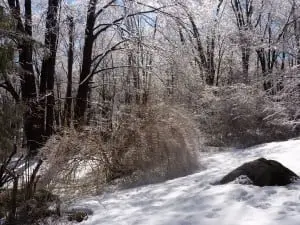By Pamela Doan
What we do in the garden reflects the way we think about the natural world in general. Consider the forests that cover our mountains and the marshes along the banks of our grand Hudson River.
What each of us does in our gardens and yards has an impact on those landscapes, as well. We live in a unique place to experience nature’s beauty, but also can observe on a daily basis its destruction and degradation. Approach the garden, whether it’s full of vegetables, flowers or a lawn, with the sensitivity, foresight, and nurturing that the forests and river deserve, too. With that in mind, here are a few resolutions for the coming year.
What’s in the dirt: Be gentle with soil. Test the pH balance of soil before planting and enhance it with organic additives like compost and shredded leaves.
Conserve water: Rain barrels and rain gardens help manage water and make it available during the droughts that we’re experiencing more frequently. Personally, after great success with a rain barrel that was used to exclusively water my patio container garden and shrubs on the east side of the yard, I’ve found two other places to add rain barrels that will provide water for several other beds this year.
Use natural resources on your property: Resolve to keep all the organic waste created on your property. Last year we had large patches of invasive Japanese barberry removed with the help of a landscaper and his backhoe. That stuff is hard to get rid of! We had it hauled away because the thorns don’t make it conducive for chipping onto paths and burning it seemed like the only other option. Otherwise, all the leaves, branches, and scraps became compost or material for soil enhancement. I needed more compost than I produced, though, and my compost was very slow to break down. This year I’m going to try a three-bin system and reach out to neighbors to see if I can convince them to bring me compostable materials they aren’t using.
Adapt to climate change in the garden: Through the Cornell Cooperative Extension Master Gardener program, I’ve been fortunate to participate in a few great educational experiences on climate change and its impact on our local area. Learning about what to expect from weather patterns and how to minimize your carbon footprint helps make for better choices and practices.
Citizen science: Contribute to national and international research tracking the changing habits of plants, trees, wildlife or birds. This could be something like the National Phenology Network, Audubon bird counts, the Great Sunflower Project tracking bees or a project with the local Department of Environmental Conservation. These are great ways to observe the landscape and projects that can engage the whole family in a learning experience.
Cut back or stop using chemicals: Whether it’s pesticides, herbicides, or fertilizer, consider other alternatives before applying any inorganic compounds. Recent research has shown that neonicitonoids, a main ingredient in many pesticides and herbicides that is a known culprit in the catastrophic loss of bee colonies, also has health risks for children. Every chemical we dump on our lawns and gardens can have a much larger consequence for the ecosystem that goes far beyond the original application. Contact the Putnam County Cornell Cooperative Extension office to get help when you’ve got a pest, pathogen weed or nuisance to manage.
Right plant, right place: Learn about a particular plant before bringing it home from the garden center. Putting a shade plant in partial sun or a plant that prefers dry soil in a patch with soil that holds water will make for high maintenance and lousy results. Maximize resources through careful planning.
Go native: Native plants are disappearing in our forests. Their habitats are being taken over by invasive plants and deer have decimated their populations. The Native Plant Center in Westchester is a tremendous resource for our area and offers classes and plant lists for anyone interested in helping restore and maintain native plants.
Volunteer: Plant a tree, cleanup Fahnestock State Park, maintain trails, or spend a few hours on the river. There are many outstanding organizations in our area that can use help and it’s a great way to meet people and learn more about the community.
Experiment: Our climate is changing. Try new plants; maybe they wouldn’t grow here 20 years ago but will now. Plants that can handle a wide-range of conditions like droughts, heat waves, and fluctuating temperatures will be the most successful in the coming years. Don’t just stick to tried and true alternatives but try something new every year.

